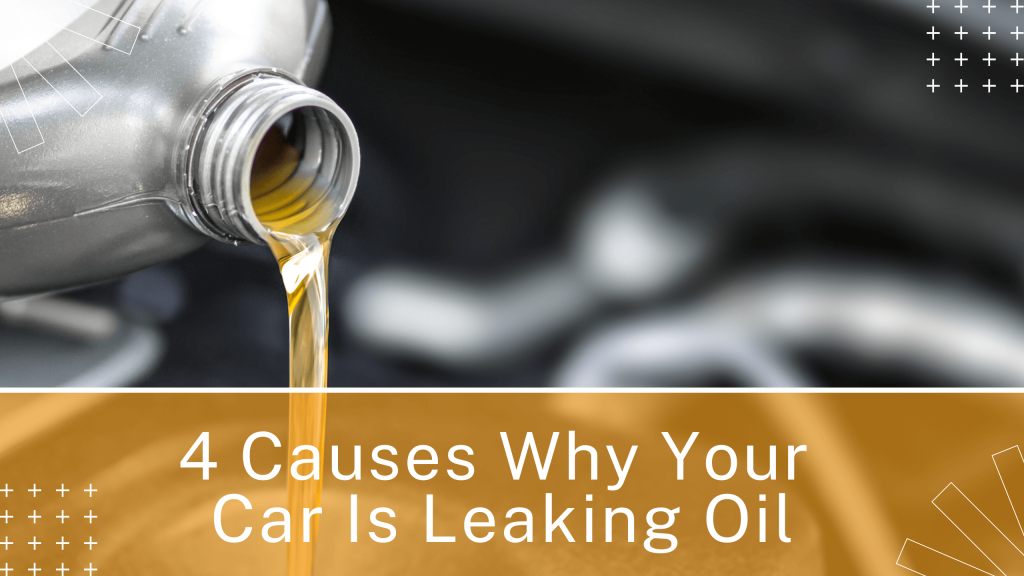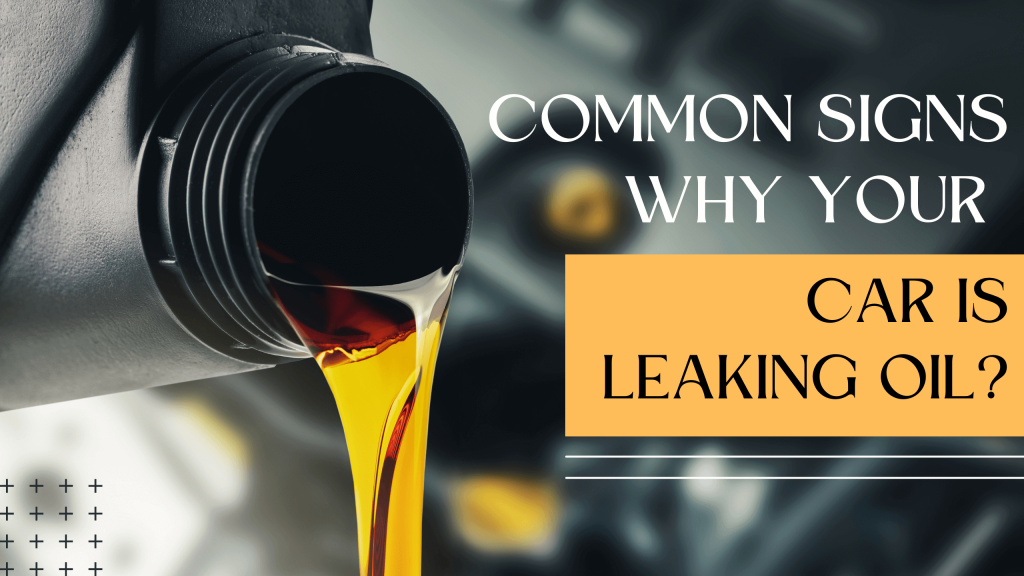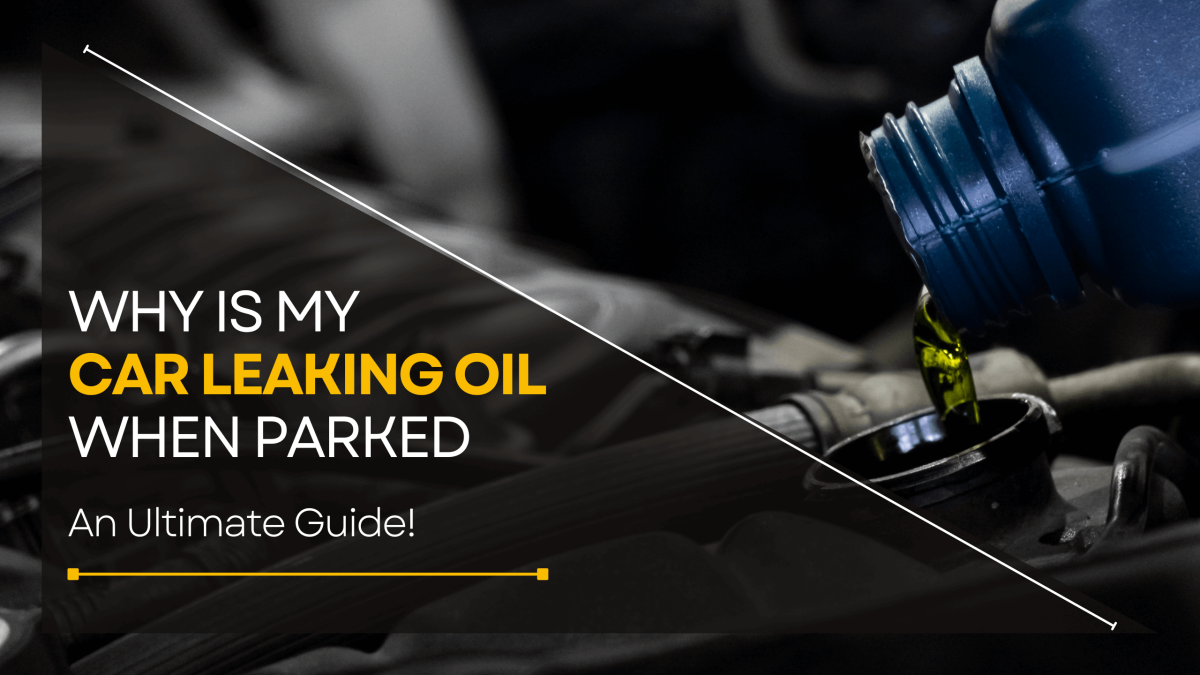November 10, 2022
Why Is My Car Leaking Oil When Parked: An Ultimate Guide
Here is a complete guide if you are wondering, “Why is my car leaking oil when parked”?
Oil leaks are a terrible issue that affects more than 80% of drivers. Cars frequently have oil leaks. They can occur for various causes and can be very expensive to fix. Oil seeps out from around the engine block due to a worn-out gasket or seal in the engine, which is the most frequent source of oil leaks. Age, inactivity, or faulty gasket or seal installation are all possible causes of this. So, if your car is leaking oil when parked, you might need to replace the gasket or seal to get the oil leak to stop.
Why is My Car Leaking Oil When Parked?
Your car may be leaking oil when it is parked for many reasons. Oil leaks are usually a concern if you see a car leaking oil on your driveway, sidewalk, or even on top of your car, you should stop driving it and call an auto mechanic right away. If the oil leaks increase over time and you haven’t been driving a lot, the engine or transmission may have problems. It is often due to degraded engine gaskets or oil seals. These components will deteriorate over time, but you may also have an older dirty oil since you haven’t had your oil changed in a while.
4 Causes Why Your Car Is Leaking Oil
 Your engine oil is crucial to its lifespan, so an oil leak is among the last things you want to happen. Do not delay fixing the problem if you observe typical indicators of an oil leak car, such as dark puddles under your car or an illuminated oil light on the dashboard. Below are four major causes of the issue. Let us quickly understand them.
Your engine oil is crucial to its lifespan, so an oil leak is among the last things you want to happen. Do not delay fixing the problem if you observe typical indicators of an oil leak car, such as dark puddles under your car or an illuminated oil light on the dashboard. Below are four major causes of the issue. Let us quickly understand them.
-
Worn-out oil filler
Without regular maintenance, oil filters degrade over time and cause leaks. Oil can become contaminated while garages are not being serviced. Going too long between oil changes can cause seals; gaskets to break, leading to leaks. Oil filters are made to trap contaminants from the engine oil – swap them out with every regular service appointment or get an oil change at a local dealership.
-
Damaged Oil Gaskets or Pans
The oil pan of your car is one of the most vulnerable things in the car. It is on the bottom and located under rocks, sticks, or anything else on the road that can damage it. You don’t want it to leak while driving; that’s just a recipe for disaster. Punctures or debris on a road’s surface can cause oil leakage in the car. The oil pan is sealed by an O-ring that gets worn out over time, making its location more challenging to fix. Valve covers are used for keeping the oil inside a vehicle and are generally rubber or cork-like gasket sealant. Rubber products, especially in harsh climates, wear out and grow brittle over time.
-
Broken filler cap
If you notice that you’re losing oil, be sure to have your engine checked. However, one of the easiest ways to check whether or not you require an engine repair is by checking the oil fill level. Pop off the engine’s filler cap and ensure there’s enough oil inside. If your engine is leaking oil from the car and has a damaged or missing seal, it’ll leave traces. Please make sure the seal on the cap of your oil is intact, and take care to tighten it securely. Replace if you notice any wear or damage.
-
Excess oil
Your car’s engine may spill and leak oil if you use too much oil in it. It can harm engines and produce leaks as well. If too much oil is in the system, the crankshaft may suffer higher pressure, leading to engine overload.
Common Signs Why Your Car Is Leaking Oil?
 Your car’s engine oil is vital to its operation. Therefore leaks can be dangerous. Given how essential oil is to the operation of your engine, it is advisable to watch out for any indications of an oil leak. However, things might not always be clear if you don’t know what you’re searching for. Below, you’ll find four potential indicators that your car’s oil leaks.
Your car’s engine oil is vital to its operation. Therefore leaks can be dangerous. Given how essential oil is to the operation of your engine, it is advisable to watch out for any indications of an oil leak. However, things might not always be clear if you don’t know what you’re searching for. Below, you’ll find four potential indicators that your car’s oil leaks.
-
Low Oil Pressure Light On
When there is an issue, several lights on your dashboard flash and the oil pressure light resembles a genie’s lamp or an antique oil can. If this warning light illuminates, it indicates that your engine’s oil pressure is inadequate. While there are other possible causes for this, such as a broken oil pump, it is also possible that there is not enough oil in the system to sustain the required pressure. Whatever the reason, you shouldn’t ignore the light. Instead, stop when it’s safe and turn the engine off. Topping off the oil might buy you some extra time to get where you’re going, but before the engine is harmed, you should have professionals investigate why the oil pressure decreased. Whatever you do, avoid using your car while the oil light is on.
-
Engine Ticking Noise
The engine noise may indicate that the higher engine components must be serviced more thoroughly when ticking, banging, or idling. Low engine oil levels, utilizing the incorrect engine oil type, insufficient engine oil pressure, or a timing belt or chain issue are all potential causes. An ongoing oil leak is a frequent reason for odd noises coming from the engine. The engine’s valves and tappets will suffer the most damage if an oil leak occurs. Lack of lubrication might cause these to wear out and become louder.
-
Blue Smoke
Blue smoke from the exhaust indicates an oil leak, which is why your engine is burning oil. A leaking valve seal or a piston ring issue could cause this symptom. The problem is that the engine seals fail to adequately prevent oil from entering the cylinders. When the fuel burns, the oil that escapes may combine with it and ignite. Once this reaction occurs, you see blue exhaust smoke. If the blue smoke appears when you accelerate, a piston ring problem is typically to blame. Your piston rings may become clogged with sludge and carbon, making it impossible for them to function correctly; however, if blue smoke emerges when braking, a cylinder valve issue is typically to blame.
-
Overheated engine
Engine oil is essential to maintaining the temperature of the engine. It lubricates the piston and ensures that pistons slide into their housing without resistance. In the absence of insufficient lubrication, pistons start rubbing against the engine components, which produces a lot of heat, because of which the engine might lock up or stall. The engine may overheat if there is a leakage of oil and the oil level falls too low. If your engine overheats, the metal may expand past the motor’s design tolerance. The gaskets may be stretched, torn, or otherwise damaged as the metal expands and contracts, leading to an immediate or delayed oil spill. If your engine recently overheated, keep an eye out for oil leaks from areas like the valve cover gaskets and oil pan gaskets.
How To Fix An Oil Leak?
- The first step in fixing an oil leak is to find it. If the noise is coming from the engine, look for leaks or spilling fluids near the valve cover and oil pan. If required, change the gasket that is leaking.
- Check the oil level and the engine for any indications of contamination or sludge if the noise comes from the oil filter. If you think there may be another leak source, look under the car for any evidence of fluid pools or leaks.
- Inspect the area surrounding all hoses, belts, and other moving parts, and look for any leaks. It is important to figure out the root cause of an engine leak. Not every leak from the engine will be apparent. Therefore, it is important to inspect it regularly for the oil level and oil changes.
- Record the levels to determine how much oil your engine might leak. After the engine has been idle for at least 30 minutes, check your oil to allow the oil to settle back into the pan. Remove the dipstick, clean it with a fresh rag, and reinstall it while the engine is off.
- Read the level indication after removing the stick once more. Full or just a little below complete levels are okay. An under-top-off indicates a need for a top-off. It’s important to consult a dependable professional if the level is continuously low.
Conclusion
Although there are multiple products available in the market that can assist in stopping oil leaks, sending your car to a local car engine service shop is the best method to ensure the problem is fixed from the core. It is crucial to stop an oil leak as soon ASAP, regardless of the reason.
By now, you must have got the answer to “Why is my car leaking oil when parked?”, most probably the cause is the worn-out gasket or seal in the engine. Bring your automobile to the closest repair facility if you observe an oil leak while it is parked, engine oil leaks, a burnt oil or smoke odour, or declining oil levels. You might be able to avoid significant engine damage by being proactive and fixing the leaks sooner rather than later.

